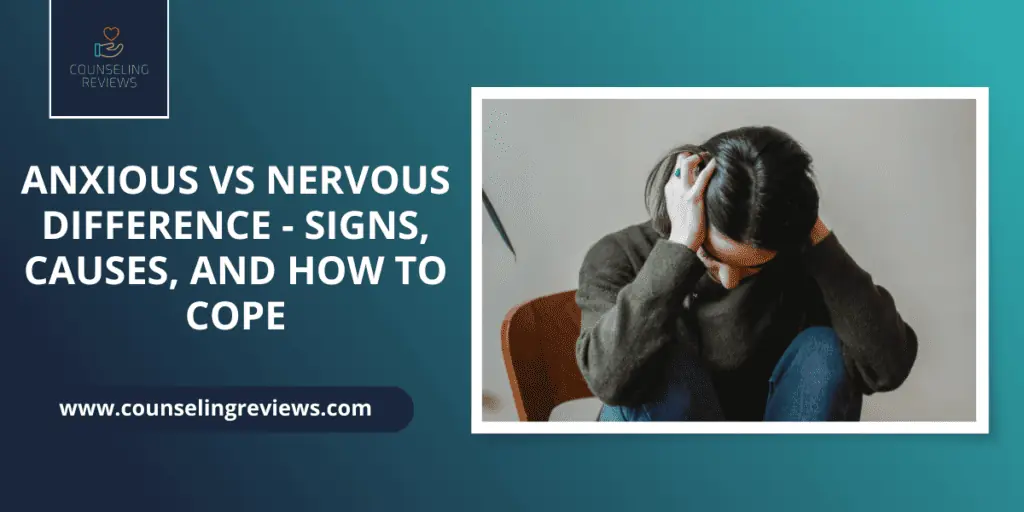Anxiety is a clinical condition which can range from mild to severe. Nervousness is usually mild and is a response to stress patterns in life. When the stressful event is over, people often feel calmer, and the nervousness disappears.
On the other hand, anxiety has physical symptoms such as trembling hands and feeling nervous but also includes cognitive aspects such as fear of things going wrong, catastrophizing events, jumping to conclusions, and other cognitive distortions. Both nervousness and anxiety are natural reactions to stressful situations.
This article examines how to identify anxiety and nervousness and when to seek help.
How to know it’s anxiety
Anxiety is a formal mental health diagnosis, which is often described as generalized anxiety disorder, specific phobias, or panic disorder. You may experience intense tension, worrying thoughts, and physical sensations such as shaking hands, a sinking feeling in the chest or stomach, etc.
Although many people say they’re feeling nervous, they may be experiencing anxiety if it happens frequently. Anxiety is more severe than nervousness and interferes with your daily activities.

Signs
Anxiety is a broad term that consists of various diagnoses, such as specific phobia, generalized anxiety disorder, and panic disorder. Each diagnosis has particular signs and symptoms, which may vary in severity. However, all of these diagnoses have an emotional or physical component and involve cognitive and behavioral aspects.
Here are some examples:
- Being unable to speak in public makes you avoid making presentations at work.
- Avoiding sexual encounters because you experience performance anxiety.
- Avoiding public bathrooms because you feel anxious and cannot perform (social anxiety).
- Experiencing panic can manifest as breathlessness, a fear of impending doom, chest pain, and a feeling that you might even have a heart attack (panic attack).
Causes
Anxiety is intimately related to stressful events and learned coping mechanisms. Anxiety is necessary to help you take action or escape a harmful situation. However, pathological anxiety can make you believe that an innocuous situation is dangerous and keep you on tenterhooks perpetually.
This results in anxiety disorder. Most anxiety disorders are learned due to cognitive distortions and maladaptive coping mechanisms.
How to manage anxiety
Anxiety is a crippling mental health disorder that causes insurmountable distress to the sufferer. Thankfully, several treatments can alleviate anxiety. To begin with, some medicines help you calm down and relax. Secondly, cognitive behavior therapy and classic behavior therapy help you change underlying thinking patterns and maladaptive behaviors to help you deal with anxiety better.
In addition, other techniques such as meditation, grounding, talk therapy, and even exercise can help you reduce your anxiety levels. Nevertheless, seeking psychiatric and psychological help to deal with anxiety spectrum disorders is important.
How to know it’s nervousness and not anxiety
It is important to remember that feeling nervous can be a symptom of anxiety. Anxiety disorders encompass a broader range of symptoms and signs than just feeling anxious. Hence, nervousness is a milder form of anxiety that is not necessarily pathological. When you encounter a stressful situation, you may feel anxious.
For example, if you have an interview the next day, you may feel nervous all night and lose sleep. However, once your interview has been conducted, you will feel calm and relaxed and no longer feel anxious.

Signs
Nervousness resembles anxiety in many ways. You may experience sweaty palms, excessive perspiration, the sensation of your mouth going dry, and thinking about the worst happening.
However, nervousness is the moment to read, unlike anxiety. It eventually subsides once the stressful situation ends, and you’ll return to normal.
Although you may experience all the symptoms that people with anxiety may suffer from, they are usually mild and cannot be compared with a full-fledged anxiety disorder.
Causes
Stressful situations cause people to feel nervous. When there are uncertainties to face and outcomes are not known, people tend to feel nervous. Fear of being evaluated either positively or negatively can also cause nervousness. This is why you may feel uneasy even when receiving an award after achieving something excellent.
Hence, nervousness can be understood as a result of stress, which can be eustress (positive stress) or distress (negative stress). However, it is essential to remember that feeling nervous is also a symptom of anxiety. If you are feeling nervous frequently, you may need to be assessed for an anxiety disorder.
How to manage nervousness
Nervousness is a natural response to stressful situations, as discussed previously. You can handle nervousness yourself as long as it is not severe and mild. However, when you can no longer take nervousness, which begins to impact your life, you should consult a therapist or a psychiatrist.
For mild symptoms of nervousness, here is what you can do:
- Try relaxation exercises, such as Jacobson’s progressive muscular relaxation
- Practice mindful meditation so that you gain clarity and calmness.
- Engage in some physical activity so that endorphins are released. These are feel-good chemicals that help reduce anxiety and nervousness.
- Make sure that you’re on a good diet and are sleeping well. A well-rested and well-fed body is necessary to cope with stressful situations.
- Speak to someone empathetic or start taking sessions with the therapist.
Anxious vs nervous feelings – Difference Explained
Anxiety is a severe mental health condition that can be crippling. It includes various disorders, such as panic disorder, agoraphobia, specific phobias, generalized anxiety disorder, and panic disorder. All these diagnoses require expert treatment management under a clinical psychologist and psychiatrist.
Nervousness is a normal reaction to stressful situations and can include mild anxiety symptoms such as worrying about things, being unable to sleep, and feeling on the edge. You may also experience specific physical symptoms. However, this can be managed on your own as long as you practice meditation or relaxation exercises.
How can you tell which one you have?
It is quite easy to distinguish between anxiety and nervousness. Here is a checklist.
You may have an anxiety disorder if:
- Your work, interpersonal relationships, and day-to-day activities are affected.
- You feel overwhelmed and are unable to control your thoughts
- You feel thoughts are racing at the speed of light
- You experience trembling hands, sweaty palms, an impending sense of doom, breathlessness, etc
- All the above symptoms recur, and you cannot handle them alone.
You may be experiencing nervousness if:
- You feel stressed out and or unable to do anything.
- When the stressful situation is over, your worries are limited to the context and disease.
- You can manage your nervousness on your own and do not need external help.
- Meditation and relaxation exercises help you control your nervousness.
- Your symptoms are mild, and you can get on with your life and work without any interference.
How to treat anxiety
- Cognitive behavior therapy
- Pharmacotherapy (medicines prescribed by a psychiatrist)
- Behavior therapy
- Relaxation exercises
- Meditation
- Regular physical activity
How to treat nervous feelings
- Self-help strategies
- Relaxation exercises
- Grounding techniques
- Counseling
- Stress management techniques
- Self-care
Seek professional help if you can’t handle nervous feelings on your own.
People often use the terms anxiety and nervousness interchangeably. However, this is a mistake, and they are pretty different from each other, although many sensations and feelings overlap.
Anxiety disorders require psychiatric and psychological assistance, whereas you can handle nervousness. If you cannot deal with your nervous feelings, speak to a therapist who will be able to judge if your symptoms reflect an anxiety disorder.





